Politics
US Senate advances bill to end federal shutdown
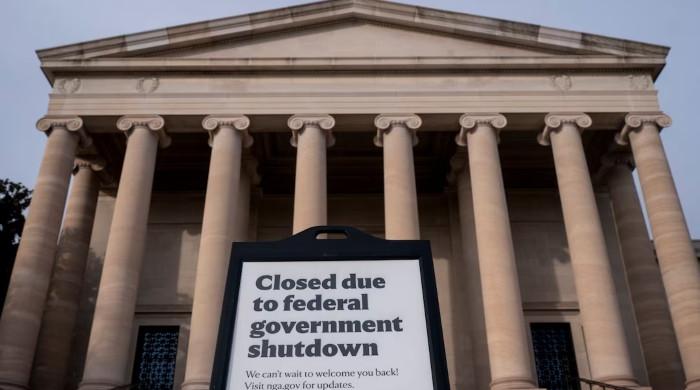
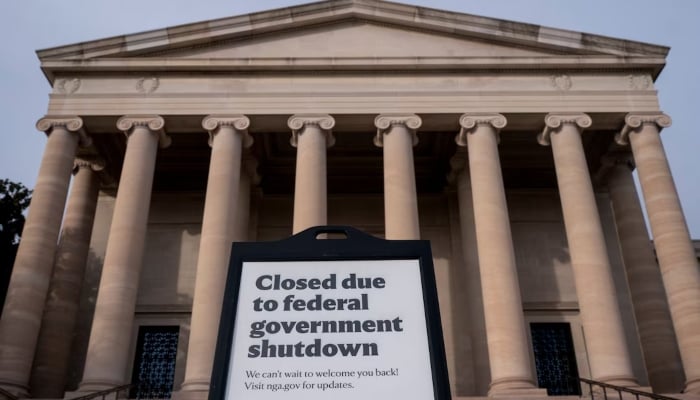
- Bill includes three appropriations measures.
- Democrats had resisted funding measure without healthcare fixes.
- Trump pushes for direct payments over ACA subsidies.
WASHINGTON: The US Senate on Sunday moved forward on a measure aimed at reopening the federal government and ending a 40-day shutdown that has sidelined federal workers, delayed food aid and snarled air travel.
In a procedural vote, senators advanced a House-passed bill that will be amended to fund the government until January 30 and include a package of three full-year appropriations bills. If the Senate eventually passes the amended bill, the package still must be approved by the House of Representatives and sent to President Donald Trump for his signature, a process that could take several days.
Under a deal struck with a group of Democrats, Republicans agreed to a vote in December on extending subsidies under the Affordable Care Act, according to a person familiar with negotiations over the bill. The subsidies have been a Democratic priority during the funding battle.
The resolution would also reverse at least some of the Trump administration’s mass layoffs of federal workers during the shutdown and fund Supplemental Nutrition Assistance Programme benefits for a year.
“All federal employees, including members of our military and Coast Guard, the Capitol police officers, Border Patrol agents, TSA screeners, air-traffic controllers, will receive their back wages” under the deal, Republican Senator Susan Collins, chair of the Senate Appropriations Committee, said of the measure.
The deal was brokered by two New Hampshire Democrats, Senators Maggie Hassan and Jeanne Shaheen, and Angus King, an independent from Maine, the person said. Senate Minority Leader Chuck Schumer, the chamber’s top Democrat, voted against the measure.
Sunday marked the 40th day of the shutdown, which has sidelined federal workers and affected food aid, parks and travel, while air traffic control staffing shortages threaten to derail travel during the busy Thanksgiving holiday season late this month.
Senator Thom Tillis, a Republican from North Carolina, said the mounting effects of the shutdown have pushed the chamber toward an agreement.
“Temperatures cool, the atmospheric pressure increases outside and all of a sudden it looks like things will come together,” Tillis told reporters.
Should the government remain closed for much longer, economic growth could turn negative in the fourth quarter, especially if air travel does not return to normal levels by Thanksgiving, White House economic adviser Kevin Hassett warned on the CBS “Face the Nation” show. Thanksgiving falls on November 27 this year.
Trump takes aim at healthcare subsidies
The wrangling on Capitol Hill came as Trump on Sunday again pushed to replace subsidies for the Affordable Care Act’s health insurance marketplaces with direct payments to individuals.
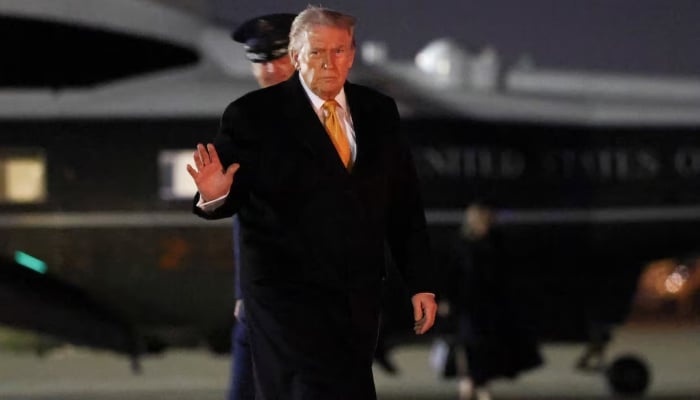
The subsidies, which helped double ACA enrollment to 24 million since they were put in place in 2021, are at the heart of the shutdown. Republicans have maintained they are open to addressing the issue only after government funding is restored.
Trump took to his Truth Social platform on Sunday to blast the subsidies as a “windfall for Health Insurance Companies, and a DISASTER for the American people,” while demanding the funds be sent directly to individuals to buy coverage on their own. “I stand ready to work with both Parties to solve this problem once the Government is open,” Trump wrote.
US Treasury Secretary Scott Bessent and Senator Lindsey Graham, a staunch Trump ally, said in separate TV interviews that Trump’s healthcare idea would not be introduced before lawmakers pass a federal funding measure.
“We’re not proposing it to the Senate right now,” Bessent said in an interview with ABC‘s “This Week” programme. “We are not going to negotiate with the Democrats until they reopen the government.”
Americans shopping for 2026 Obamacare health insurance plans are facing a more than doubling of monthly premiums on average, health experts estimate, with the pandemic-era subsidies due to expire at the end of the year.
Republicans rejected a proposal on Friday by Senate Minority Leader Chuck Schumer, a Democrat from New York, to vote to reopen the government in exchange for a one-year extension of tax credits that lower costs for plans under the Affordable Care Act, often referred to as Obamacare.
Democratic Senator Adam Schiff said on Sunday he believed Trump’s healthcare proposal was aimed at gutting the ACA and allowing insurance companies to deny coverage to people with pre-existing conditions.
“So the same insurance companies he’s railing against in those tweets, he is saying: ‘I’m going to give you more power to cancel people’s policies and not cover them if they have a pre-existing condition,'” Schiff said on ABC‘s “This Week” programme.
Politics
China eases tensions by pausing special port fees on US vessels

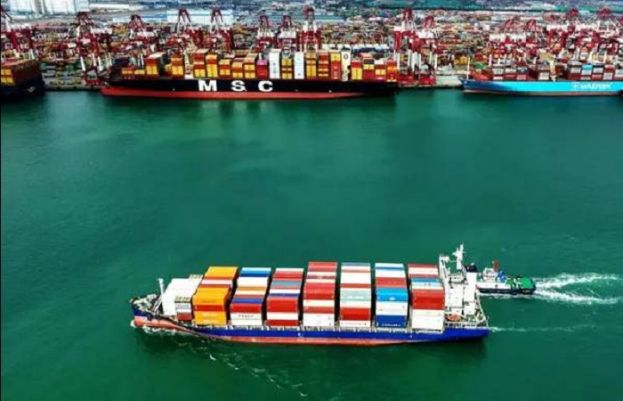
China said Monday it would suspend for one year “special port fees” on US vessels “simultaneously” with Washington’s pause on levies targeting Chinese ships, as a fragile trade truce between the superpowers continues to take shape.
The United States and China have been involved in a volatile trade and tariff war for months, but agreed to walk back some punitive measures after presidents Xi Jinping and Donald Trump met last month in South Korea.
At one point, duties on both sides had reached prohibitive triple-digit levels, hampering trade between the world’s two largest economies and snarling global supply chains.
The suspension of the port fees, which applied to ships operated by or built in the United States that visited Chinese ports, began at 13:01 on Monday, a transport ministry statement said.
The US shipbuilding industry was dominant after the Second World War but has gradually declined and now accounts for just 0.1 percent of global output.
The sector is now dominated by Asia, with China building nearly half of all ships launched, ahead of South Korea and Japan.
Separately, Beijing said it would suspend sanctions against US subsidiaries of Hanwha Ocean, one of South Korea’s largest shipbuilders.
The year-long suspension of measures against Hanwha, effective from November 10, was linked to the US halting port fees it had levied on Chinese-built and operated ships, China’s commerce ministry said in an online statement.
“In light of this… China has decided to suspend the relevant measures” for one year, the statement said.
China had imposed sanctions on five US subsidiaries of Hanwha in October, accusing them of supporting a US government “Section 301” investigation that found Beijing’s dominance of the shipbuilding industry unreasonable.
Organizations and individuals in China had been banned from cooperating with Hanwha Shipping LLC, Hanwha Philly Shipyard Inc., Hanwha Ocean USA International LLC, Hanwha Shipping Holdings LLC and HS USA Holdings Corp.
A planned probe into whether the Section 301 investigation impacted the “security and development interests” of China’s shipbuilding industry and supply chain had also been shelved for one year, according to the transport ministry.
The suspensions are the latest sign of a thaw in economic ties since the Xi-Trump meeting.
On Wednesday, China said it would extend the suspension of additional tariffs on US goods for one year, keeping them at 10 percent, and suspend some tariffs on soybeans and other US agricultural products.
China also suspended an export ban on gallium, germanium and antimony, metals crucial for modern technology, on Sunday.
Also following talks, Beijing agreed to halt for one-year restrictions on the export of rare earths technology.
Washington in turn agreed to suspend for one-year export restrictions on affiliates of blacklisted foreign companies in which they had at least a 50 percent stake, the Chinese commerce ministry said Wednesday.
Politics
UAE signals it may not join international Gaza stabilization efforts


The United Arab Emirates is not planning to join the international stabilization force for Gaza because it lacks a clear framework, a senior official said on Monday.
“The UAE does not yet see a clear framework for the stability force, and under such circumstances will probably not participate in such a force,” Emirati presidential advisor Anwar Gargash told the Abu Dhabi Strategic Debate forum.
The US-coordinated international force has been seen as likely to include troops from Egypt, Qatar and Turkey, as well as the UAE.
Last week, US President Donald Trump said he expected the force to be in Gaza “very soon”, as a fragile ceasefire holds following two years of war. The oil-rich UAE is one of the few Arab nations with official ties to Israel after signing the Abraham Accords during Trump’s first term in 2020.
Politics
South Korea special prosecutor indicts ex-President Yoon on more charges
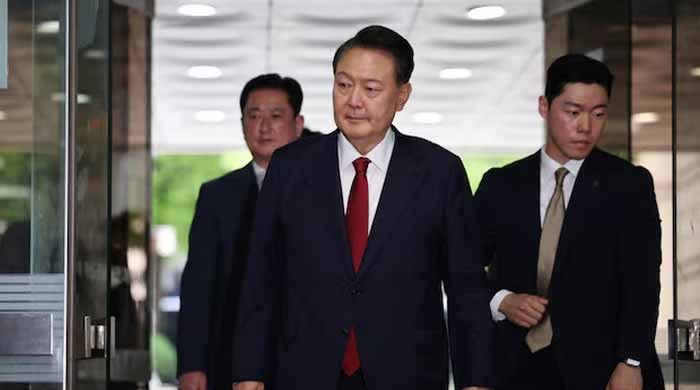
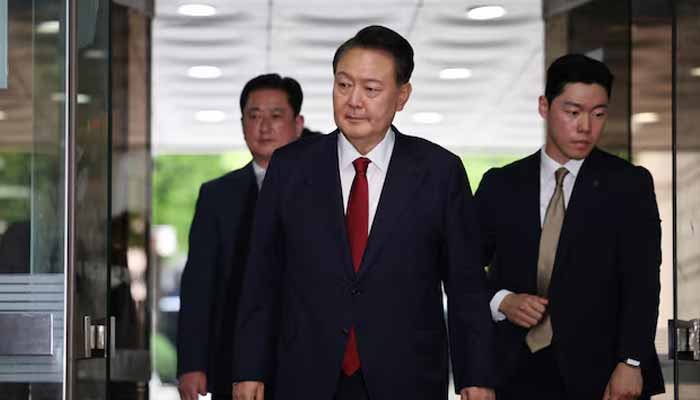
- Yoon accused of helping enemy state to provoke military tension.
- S Korea has neither confirmed nor denied flying drones to N Korea.
- Ex-president removed from office by Constitutional Court in April.
South Korea’s special prosecutor on Monday indicted former President Yoon Suk Yeol on additional charges of abusing power and aiding an enemy state related to his short-lived imposition of martial law last year.
Yoon attempted to provoke military conflict between South and North Korea in order to declare martial law, a prosecutor’s spokesperson told a briefing, citing evidence found on a military official’s mobile phone that included some words suggesting potential provocations against North Korea, such as “drones” and “surgical strike”.
Yoon was removed from office by the Constitutional Court in April and is on trial for insurrection stemming from his failed martial law declaration. If found guilty, he could be sentenced to death.
Yoon has said consistently that he never intended to impose military rule but declared martial law to sound the alarm on wrongdoings by opposition parties and to protect democracy from “anti-state” elements.
According to the memo, Yoon, former defence minister Kim Yong-hyun, and former military intelligence chief Yeo In-hyung planned to induce a North Korean attack against the South, the spokesperson, Park Ji-young, said.
The trio conspired to create tensions in the country as a justification for Yoon to declare martial law, she said.
Kim and Yeo were also indicted on the same additional charges, the prosecutor said.
The special prosecutor’s team has accused Yoon and his military commanders of ordering a covert drone operation into the North to inflame tensions between the neighbours and justify his martial law decree.
In October last year, North Korea said the South had sent drones to scatter anti-North Korean leaflets over Pyongyang, and published photos of the remains of a crashed South Korean military drone.
Despite intense scrutiny and political pressure, South Korea’s military declined at the time to comment on the suspicion of conducting a drone operation. A defence ministry official on Monday said it had no comment on the matter.
Former defence minister Kim is also on trial on charges related to the martial law declaration.
Yeo has said he deeply regretted not challenging the order from Yoon, according to media reports. The prosecutor’s spokesperson said Yeo was making excuses that did not make sense about the notes discovered on his mobile phone.
-

 Tech1 week ago
Tech1 week agoGear News of the Week: Withings Launches Its Pee Scanner, and Samsung Shows Off a Trifold Phone
-

 Business1 week ago
Business1 week agoAndy Jassy Reveals Real Reason Behind Amazon 14,000 Job Cuts — And It’s Not AI
-

 Sports1 week ago
Sports1 week agoTudor’s Juve exit means McKennie must prove himself all over again
-
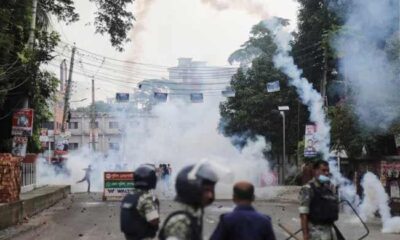
 Politics1 week ago
Politics1 week agoPolitical violence kills almost 300 since Hasina’s fall: rights group
-

 Politics1 week ago
Politics1 week agoIran vows to rebuild nuclear sites ‘stronger than before’
-

 Sports1 week ago
Sports1 week agoPakistani runners make their mark at Istanbul Marathon
-
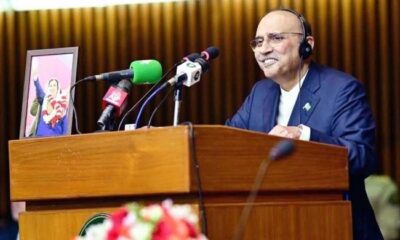
 Entertainment1 week ago
Entertainment1 week agoPresident Zardari to attend Second World Summit for Social Development in Doha
-

 Tech1 week ago
Tech1 week agoStep Away From Screens With the Best Family Board Games






